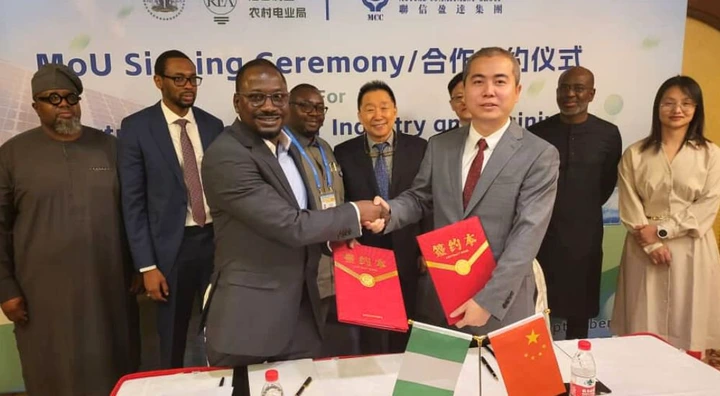The Federal Government has entered into two Memoranda of Understanding (MoU) with China’s Mutual Commitment Company Limited (MCC) to assemble electric tricycles in Nigeria. The MoUs were brokered by the Rural Electrification Agency (REA), a division of the Federal Ministry of Power, as part of the country’s strategy to advance the renewable energy sector within the broader electricity value chain.
According to a statement released on Tuesday by Mr. Bolaji Tunji, the Special Adviser on Media to the Minister of Power, Chief Adebayo Adelabu, both the minister and the Managing Director of the Rural Electrification Agency, Mr. Abba Aliyu, represented Nigeria at the signing event.
During the ceremony in Beijing, which took place on the eve of the African-China Cooperation Summit, Adelabu expressed that the signing of the MoUs marked a significant milestone for Nigeria. He highlighted the similarities between Nigeria and China, particularly their large populations, which lead to substantial pressures, especially in terms of energy access and job creation. Adelabu noted the importance of initiatives that address these challenges, expressing satisfaction that this development is occurring under President Bola Tinubu’s administration, aligning with the administration’s Renewed Hope Agenda.
The minister emphasized that President Tinubu has made the power sector a priority, recognizing it as a foundational driver for other key sectors of the economy. He pointed out that expanding energy access is a major focus of the government, stressing that a strong, stable, and reliable electricity sector is essential for progress in other areas.
Adelabu also noted that nearly 40 percent of Nigeria’s population lacks access to energy, which has significant consequences. He stated that the two MoUs would play a critical role in achieving the vision for the renewable energy segment of the power sector, with a focus on five key areas, including the development of local capacity. He observed that much of the human and material resources required across the renewable energy value chain are still heavily reliant on imports.
The minister also underscored the potential for job creation, particularly for Nigeria’s growing youth population, as polytechnics, technical colleges, and universities continue to graduate students each year without guaranteed employment opportunities. He expressed optimism that these initiatives would help bridge that gap while simultaneously expanding energy access.
Adelabu further referenced the success of northern African countries like Tunisia, Morocco, Egypt, and Algeria, which have achieved near-total electrification, and South Africa, which has reached about 95 percent electrification. He lamented that Nigeria’s electrification rate remains at 62 percent, though still ahead of some other African countries. He questioned why Nigeria, with its abundant natural resources—including gas and hydropower potential—has not achieved similar levels of electrification, and expressed confidence that these new partnerships could help close the gap.




